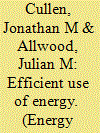| Srl | Item |
| 1 |
ID:
093472


|
|
|
|
|
| Publication |
2010.
|
| Summary/Abstract |
The efficient use of energy is a key component of current efforts to reduce carbon emissions. There are two factors which are important when assessing the potential gains from energy efficiency technologies: the scale of energy flow and the technical potential for improvement. However, most efficiency analyses consider only the potential gains from known efficiency technologies, while ignoring the complex flow of energy through the chains of conversion devices. In response, this paper traces the global flow of energy, from fuels through to the final services, and focuses on the technical conversion devices and passive systems in each energy chain. By mapping the scale and complexity of global energy flow, the technical areas which are likely to deliver the largest efficiency gains can be identified. The result is a more consistent basis for directing future research and policy decisions in the area of energy efficiency.
|
|
|
|
|
|
|
|
|
|
|
|
|
|
|
|
| 2 |
ID:
150878


|
|
|
|
|
| Summary/Abstract |
Building sector consumes a significant amount of energy worldwide (up to 40% of the total global energy); moreover, by the year 2030 the consumption is expected to increase by 50%. One of the reasons is that the performance of buildings and its components degrade over the years. In recent years, energy benchmarking for government office buildings, large scale public buildings and large commercial buildings is one of the key energy saving projects for promoting the development of building energy efficiency and sustainable energy savings in Gulf Cooperation Council (GCC) countries. Benchmarking would increase the purchase of energy efficient equipment, reducing energy bills, CO2 emissions and conventional air pollution. This paper focuses on energy benchmarking for shopping centers in Gulf Coast Region. In addition, this paper will analyze a sample of shopping centers data in Gulf Coast Region (Dubai, Ajman, Sharjah, Oman and Bahrain). It aims to develop a benchmark for these shopping centers by highlighting the status of energy consumption performance. This research will support the sustainability movement in Gulf area through classifying the shopping centers into: Poor, Usual and Best Practices in terms of energy efficiency. According to the benchmarking analysis in this paper, the shopping centers best energy management practices in the Gulf Coast Region are the buildings that consume less than 810 kW h/m2/yr, whereas the poor building practices are the centers that consume greater than 1439 kW h/m2/yr. The conclusions of this work can be used as a reference for shopping centres benchmarking with similar climate.
|
|
|
|
|
|
|
|
|
|
|
|
|
|
|
|